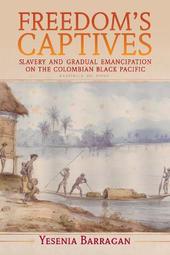
|
Freedom's Captives: Slavery and Gradual Emancipation on the Colombian Black Pacific
Paperback / softback
Main Details
| Title |
Freedom's Captives: Slavery and Gradual Emancipation on the Colombian Black Pacific
|
| Authors and Contributors |
By (author) Yesenia Barragan
|
| Series | Afro-Latin America |
|---|
| Physical Properties |
| Format:Paperback / softback | | Pages:344 | | Dimensions(mm): Height 229,Width 152 |
|
| Category/Genre | Australia, New Zealand & Pacific history
Slavery and abolition of slavery |
|---|
| ISBN/Barcode |
9781108941051
|
| Classifications | Dewey:306.362098615 |
|---|
| Audience | | Professional & Vocational | | Tertiary Education (US: College) | |
|---|
| Illustrations |
Worked examples or Exercises; Worked examples or Exercises
|
|
Publishing Details |
| Publisher |
Cambridge University Press
|
| Imprint |
Cambridge University Press
|
| Publication Date |
1 September 2022 |
| Publication Country |
United Kingdom
|
Description
Freedom's Captives is a compelling exploration of the gradual abolition of slavery in the majority-black Pacific coast of Colombia, the largest area in the Americas inhabited primarily by people of African descent. From the autonomous rainforests and gold mines of the Colombian Black Pacific, Yesenia Barragan rethinks the nineteenth-century project of emancipation by arguing that the liberal freedom generated through gradual emancipation constituted a modern mode of racial governance that birthed new forms of social domination, while temporarily instituting de facto slavery. Although gradual emancipation was ostensibly designed to destroy slavery, she argues that slaveholders in Colombia came to have an even greater stake in it. Using narrative and storytelling to map the worlds of Free Womb children, enslaved women miners, free black boatmen, and white abolitionists in the Andean highlands, Freedom's Captives insightfully reveals how the Atlantic World processes of gradual emancipation and post-slavery rule unfolded in Colombia.
Author Biography
Yesenia Barragan is Assistant Professor of Latin American History at Rutgers University in New Brunswick, New Jersey. She is the author of Selling Our Death Masks: Cash-for-Gold in the Age of Austerity (2014) and Principal Investigator of the bilingual digital database The Free Womb Project.
Reviews'Freedom's Captives is a unique and elegantly written study of slavery, freedom, and unfreedom that creatively challenges assumptions to inform our understandings of Early Modern African-descended people in the Americas. The book will establish Barragan as a preeminent scholar on free womb laws and practices as they related to the abolition of slavery.' Kevin Dawson, Associate Professor of History, University of California, Merced 'With great insight, Yesenia Barragan introduces the concept of 'free-womb captivity' to parse the predicaments of Black autonomy in the aftermath of Colombia's 1821 Free Womb Law. The resulting work is a brilliant analysis of the project of gradual abolition that prompts new ways to think comparatively about the Black Pacific and the Atlantic world. Freedom's Captives sets a new standard for writing about the Spanish American abolitions of the mid-nineteenth-century.' Celso Thomas Castilho, Vanderbilt University 'Freedom's Captives is a fascinating and important contribution to the study of slavery and abolition in Spanish America. From the perspective of the "Black Pacific" region of Colombia, one of slavery's cores in South America, Barragan weaves together the histories of legal abolition in the new republic with remarkable traces of the lives of the enslaved and freed people in Choco. The book powerfully illustrates crucial nuances in the process of Colombia's gradual abolition, while integrating Spanish America in broader discussions on abolition in the Atlantic world.' Marcela Echeverri, Yale University and author of Indian and Slave Royalists in the Age of Revolution 'Yesenia Barragan's captivating book takes us to Colombia's Choco in the first half of the nineteenth century and masterfully exposes the tensions of gradual emancipation. It honors the lives of those whose freedom was delayed and helps us understand the complex paths of erecting new republics.' Claudia Leal, Associate Professor of History, Universidad de los Andes in Bogota, Colombia
|